
By Ariel Wright | Reporter
Baylor’s School of Social Work hosted guest speaker Rev. Chanequa Walker-Barnes, professor at Columbia Theological Seminary and womanist theologian, to speak on the significance of tenderness in a time of difficulty on Tuesday.
Walker-Barnes opened her presentation with instances of terror globally, highlighting instances on American soil as well. According to the Anti-Defamation League, there has been a significant increase in white supremacist propaganda, including the distribution of racist, antisemitic, and anti-LGBTQ+ fliers, stickers and graffiti. Their data reflects a 38% increase between 2021 and 2022.
“Tenderness is not just something we embody for others; it is something that we embody for ourselves, especially as we attempt to live, thrive, and work for justice under the siege of terror,” Walker-Barnes said.
Black students from predominantly white institutions have been speaking out against the racism they experience on campus and the lack of support they feel their institutions offer. According to KFF Health News, a UCLA study published in the American Academy of Pediatrics that young adults who experience discrimination risk higher rates for short- and long-term behavioral and mental health problems.
Guests attended the event to hear more about how to support their peers, as well as themselves, in times of need.
“There are going to be times where you’re put into vulnerable situations, and it’s going to be something that you didn’t expect from certain individuals,” Dallas senior Tyler-Wyatt Langley said. “But also understanding that each encounter with someone is going to be a lesson, whether it’s a positive or a negative.”
Throughout her speech, Walker-Barnes underscored the significance of not only speaking out against terror but also t time for self-care and tenderness with one’s self and those around them. She applied themes from her book, Sacred Self-Care: Daily Practices for Nurturing Our Whole Selves to emphasize the need for self-reflection and self-care in times of struggle.
“I think the most impactful thing for me was her talking about self-care because it’s very easy to get caught up in your, your mission, your goal for things, and then kind of neglect yourself because you do want to be the best,” Dallas senior Danielle Sogbesan said.
Walker-Barnes pointed to three ways to practice tenderness in times of terror: including tending to self, community, faith, hope and joy. All of these pieces combine to embody the love of Christ, according to Walker-Barnes.
“We must promote the welfare of the sea to pray for the Lord for it because our future depends on his welfare. We must be joyful. We must be merciful. We must be hopeful. We must be tender,” Walker-Barnes said.
Walker-Barnes’ words of peace and love are meant to encourage students and community members to stand up against the terror of hatred while maintaining an open heart.
“I think she created a space for people to feel those emotions,” Sogbesan said. “For example, saying ‘Yes, this did hurt me, I am angry, but that doesn’t mean I have to turn that into hatred,’ we can turn that into progression and education in our community.”





